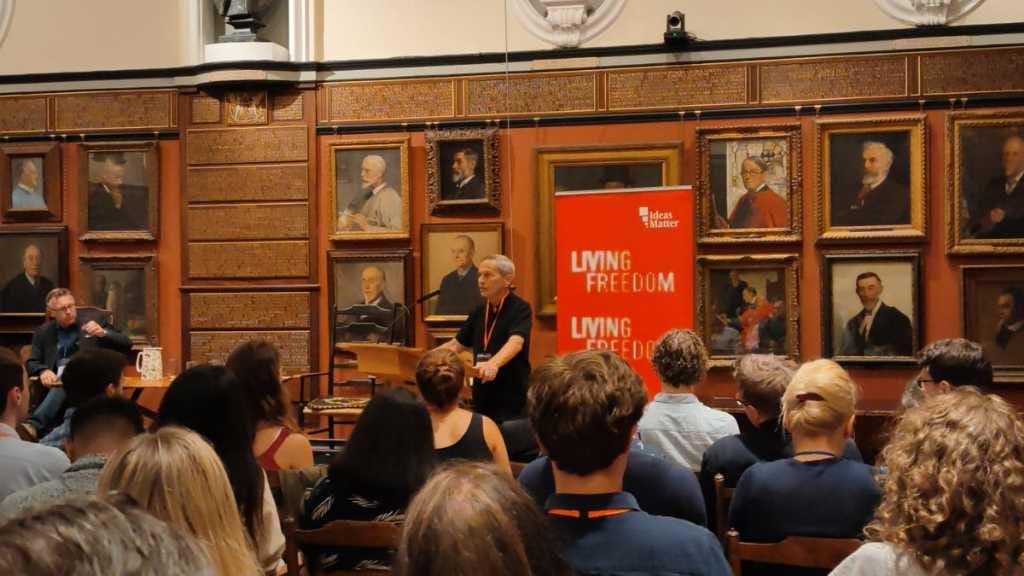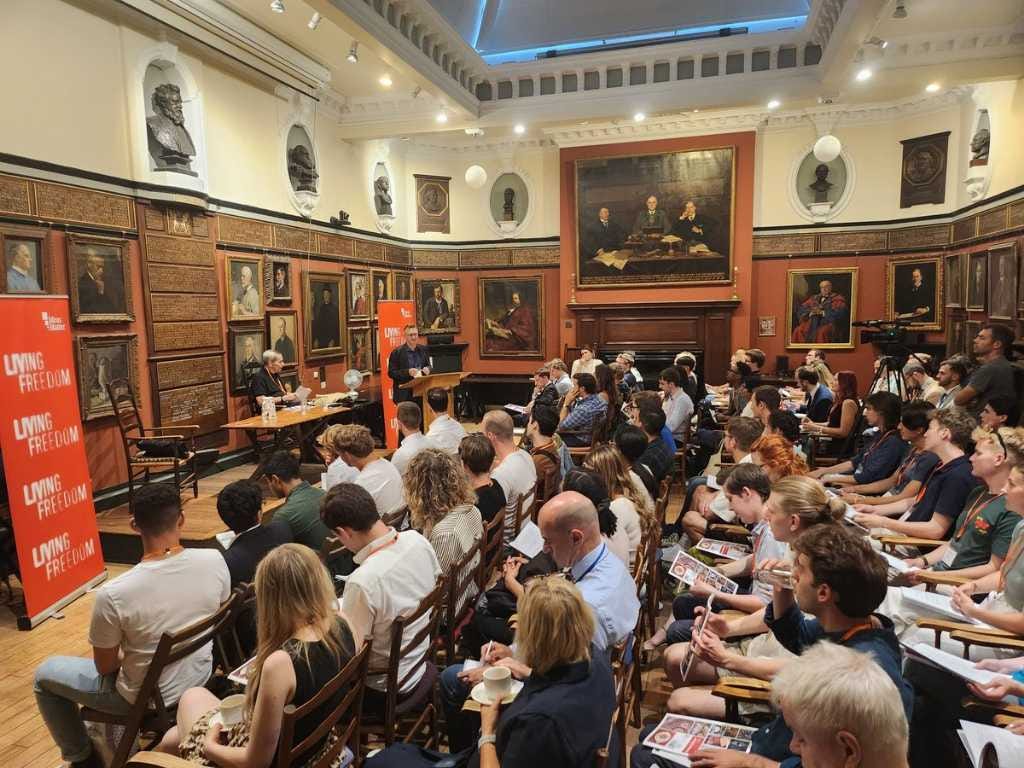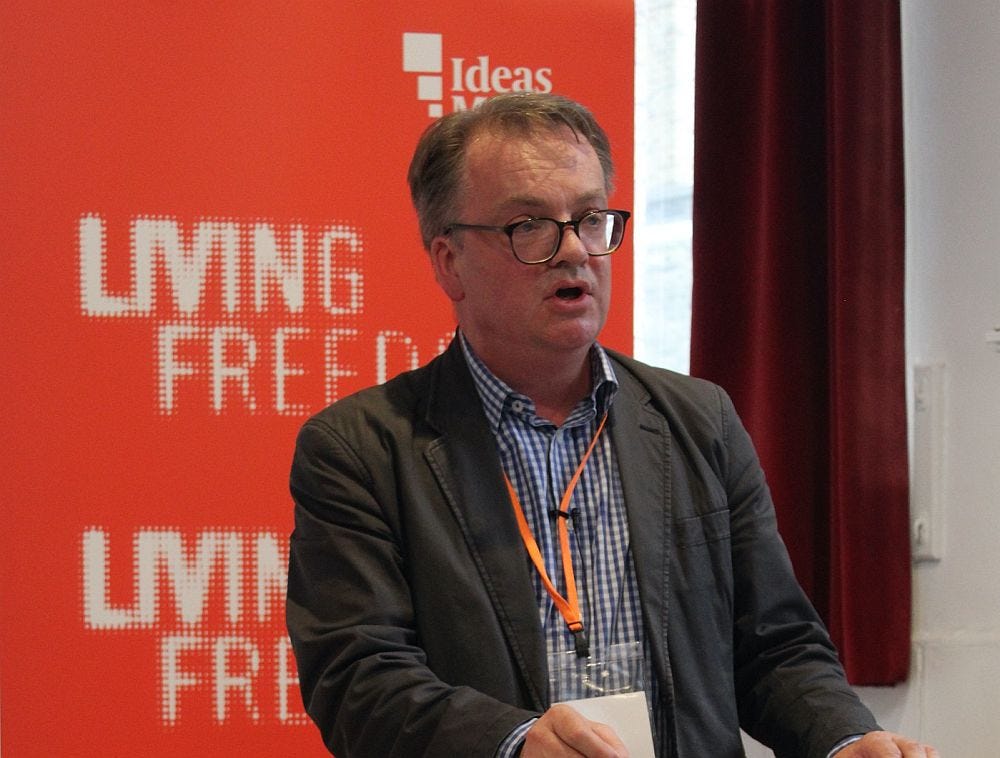Living Freedom: Why English Literature matters
As English Literature is dragged into the culture wars and reduced to a tool for political and social change, read Dr David James's powerful speech from the Living Freedom Summer School 2023.
Organised by the educational charity Ideas Matter, Living Freedom exists to renew freedom through education and debate. Last Thursday evening in central London, 75 young enthusiasts for freedom, who had travelled from across the UK, Europe and North America, gathered at our annual summer school. They spent the next three days debating the meaning and ideals of freedom in the twenty-first century. They rose admirably to the challenge that I outlined in my welcome remarks: to remake the case for freedom for our times, when not only is freedom under attack - for example from cancel culture and state intrusions into our liberties - but perhaps more importantly, when we are witnessing an internal corrosion and loss of belief across society in freedom as a fundamentally important value, in and of itself.
Inspired by speakers tackling a diverse range of topics - from freedom of conscience in the twenty-first century to the moral and material case for progress and from what it means to be human in an age of generative AI to how we should respond to the rise of the hecklers veto on campus - this was a gathering that challenged the downbeat pessimism that exists amongst many as to the prospects for a generational resurgence of belief in freedom.
Instead, the young adults present demonstrated an openness to discussion, debate and getting to grips with intellectual challenges. That can only inspire confidence more broadly that younger generations can embrace the challenge of renewing and indeed living freedom. At a time when society has too often embraced the comfort blanket of safety for the more difficult, but ultimately more rewarding project of risk-taking and even embracing the discomfort of dealing with twenty-first-century uncertainties, the summer schools was very heartening.

The school also represents an opportunity to get to grips with the best that has been said and written over the centuries. At a time when one side in the culture wars tries to systematically distance society today from its history and traditions, we continued an important summer school tradition, of exploring the classics and encouraging engagement with history. In this respect, we are publishing below a talk from David James entitled ‘Why Literature Matters’.
Over the weeks ahead, we’ll be releasing audio and video of many of the talks from the summer school. Make sure you do not miss out by subscribing to the Ideas Matter podcast (via Soundcloud or your podcast app) and to our regular newsletter. There you’ll find all the details of our forthcoming events, including, later this month, a discussion on the misinformation wars. There will also be a series of salon discussions in universities around the UK later this year.
Remaking the case for freedom in the twenty-first century is one of the biggest challenges we face. As Living Freedom Summer School demonstrated, there are encouraging signs that the next generation are up for the challenge.
Why Literature matters
Dr David James
The study of English Literature appears to be in terminal decline. Between 2011 and 2021, the number of students studying the subject at university fell by a third. Between 2021 and 2022, A-level numbers fell by 8.9%. What was once one of the most popular A-levels in the country will no longer be in the top 10 next year.
Furthermore, the number of men studying English Literature is down 44% in 10 years. (I should add that the number of undergraduates studying modern languages is down 39% over the same period.) We are a country that is falling out of love with not only one of its greatest creations - the English language expressed in its finest form - but we are losing our understanding and interest in language itself. Language, instead of being creative, is increasingly reduced to the purely functional.
A recent British Academy report, snappily titled ‘English Studies Provision in UK Higher Education’, makes for bleak reading. The authors write of the various English studies (Literature, Language, creative writing) as being in ‘precipitous’ decline.
A decline in popularity on this scale in any subject should be a concern to anyone who works in secondary or higher education, but for it to be in a subject which lies right at the core of our national identity is particularly depressing. This is a little bit reductive, but think of certain countries and the art forms they are most closely associated with. The United States? Jazz, rock and roll, blues, Gershwin, the Great American Songbook made popular by Frank Sinatra. Russia: literature. Italy: art. England: literature.
Indeed, you could take it further and say if you wanted to distil literature down into one word, or one image, it would be Shakespeare. Shakespeare’s influence is so great, so almost unending, that it is impossible to imagine English existing independently from him: his words weave their way through all those who speak this astonishing language. He seems to be omniscient, ever present, there at the great state events such as the Coronation and the Queen’s funeral, in allusions in songs, films, newspaper articles. Phrases that he coined surface like gold in the muddied language we use. But for how much longer? How much longer before that inheritance vanishes into air, into thin air?
Last year, almost 40,000 working-age teachers left the profession, the highest level since records began in 2010, according to new school-workforce data released by the Department for Education this month. The National Association for the Teaching of English believes the decline in recruits training to teach English is being caused in part by a slump in the number of students choosing to study English at A-level. This summer, about 54,000 students are sitting an A-level in English, down 40% from just under 90,000 in 2012.
This is how a subject dies: it enters a vicious cycle of low numbers doing A-level, which leads to ever-lower numbers studying it at degree level, which in turn results in fewer teachers qualified enough to teach the subject, which results in fewer students doing the subject because the teachers they have are not subject specialists and lack the knowledge to stretch and inspire them. In the near future it is not too far-fetched to imagine increasing numbers of non-subject specialists who can read and write will be drafted in to teach English Language GCSE, and English Literature GCSE and A-level will, like Latin and Greek, increasingly be the preserve of the middle-class kids attending independent schools.
Now, I work in an independent school, and I can honestly say that were this to happen it would be a national catastrophe. The arts, and I would include literature here, cannot become the pursuit of the wealthy. Literature itself would die, and it would have less and less relevance to those outside certain postcodes in London and the Home Counties.
Why does this happen?
For some, like Barbara Bleiman - one of the many educational consultants who advises schools, telling teachers what they should be teaching and how - the problem is a strange combination of there being, in her view, no teachers who are against teaching the canon, but there also being too few writers from non-traditional backgrounds. In other words, what we need is greater diversity of authors. But who goes from the curriculum and who stays? Whose writer of genius is another person’s mediocrity? Who decides who is in the canon, and what is studied at GCSE, A-level and degree level?
Predictably, like everything else it seems, English has been dragged into the endless culture wars. This is no more evident than in the taught curriculum, where debates led by people like Bleiman continue. You don’t have to go too far on Twitter to see English (and other) teachers who seem to see themselves as activists first, and teachers second.
Jeffrey Boakye, an English teacher and the author of I Heard What You Said, is black British man of Ghanaian heritage. For him ‘being a non-white teacher is an inherently political position’ and the values of white culture are rooted in ‘genocide, slavery and colonialism’. When confronted with such extreme terms, it is not surprising that so many people find it difficult to challenge these terms for fear of being accused of being an apologist for Empire, and by extension, slavery.
For many, English Literature is another tool for instigating political and social change. I have a pet theory that JB Priestley’s An Inspector Calls, which is a socialist play, is one of the most influential plays ever written and studied in this country. It is more likely that writers perceived as being ‘problematic’ (such as Philip Larkin) will be removed before Priestley.
English is, of course, political. You could argue that some works of literature have had a truly significant impact on how societies have developed: To Kill a Mockingbird, Of Mice and Men, An Inspector Calls, Nineteen Eighty-Four and Animal Farm have, for good or bad, changed how we see ourselves and our politicians.
But it is not, and should not be, political first and literary second. English Literature should not be seen as a subset of Politics or Sociology: if it is then it is undermined, it negates its own importance.
You may recall the recent controversy around the exam board OCR deciding that writers such as Larkin, Thomas Hardy, William Blake, John Keats and Gerard Manley Hopkins should be dropped and replaced by writers who are more diverse. This was a political, not a literary judgement. It is an attempt to view the past through the lenses of the present. The writers who have replaced the male, pale and stale are, almost every one, inferior. Ian Leslie has written:
The OCR is effectively lowering the status of poetic tradition and raising the status of contemporary poetry, in order to meet certain social goals. Just because the decision-makers sit in an office in Cambridge instead of waving placards in the street, and just because they deploy bland language, that doesn’t mean they’re not engaged in politics.
The irony of such changes is that they don’t widen diversity of thought. The desire to make reading lists more reflective of those who read them, understandable though it is, is only genuinely progressive if the works they contain are, in the words of another absent writer, ‘the best words in the best order’. This isn’t. As an introduction to the beauty and scope of English Literature it is a long, anguished, confusing apology.
Keeley Nolan, OCR’s lead subject adviser, proclaims that it includes more ‘contemporary and established poets of colour’. There are two problems with such a statement. Firstly, GCSE specifications in literature should only include contemporary writers when they are, like the now deleted Seamus Heaney, long established, their genius proven over decades – not because they have written something today about today. The best judge of literary merit is time. Secondly, to see anyone, whether it is a writer, or a pupil studying their work, through the lens of colour is reductive. Teachers, and works of art, should attempt to go beyond the confines of those who want to restrict understanding to the narrow strictures of their own – very fixed – political preoccupations.
Tomiwa Owolade, the Black British writer, whose new book, This Is Not America, I would highly recommend, argues that the idea that black students connect most with poetry written by black poets is ‘nonsense’. Owolade writes:
Why should a black African student, for instance, identify at all with a poem written by a West Indian man? Because of their shared race? Race is not the only thing that defines the life and experiences of a person; I used to think only avowed racists believed it does. At a more practical level, why should a poem be taught if it can speak to students only on the basis of their being black: what about the Asian and white and mixed-race students in the classroom? This is not inclusion; it is division.
Removing a writer like Larkin from the taught curriculum does a disservice to the students and their teachers. Larkin - and all great writers - achieves a level of universality that transcends division and the superficial. In ‘Aubade’ for example when he writes about death being:
The sure extinction that we travel to
And shall be lost in always. Not to be here,
Not to be anywhere,
And soon; nothing more terrible, nothing more true.
Larkin’s imagination, his command of language and his stylistic diversity go beyond the colour of skin, the class you were born into, the predicted set of values an exam board expects you to have because of inherited characteristics. For English Literature to begin to grow again, it must regain its self-confidence as a subject in its own right, not as something that always has been seen in relation to other priorities and fixed interpretations of the human conditions.
It must put the beauty of language, and its innate ability to be the opposite of prescriptive, or didactic, but be instead ambiguous.
Literature should explore conflict, but also reveal how we can rise above that through language and thought. Too often now we see ourselves defined by conflict. Great writers learn from each other, irrespective of their colour or backgrounds: Zadie Smith has learned from Dickens, Achebe borrowed from Yeats, and so on. There is conflict in literature, because it is human, but there is also continuity. Literature reveals the commonality of the human condition, as well as its variety.
Saul Bellow once asked: ‘Who is the Tolstoy of the Zulus?’ To which a writer called Ralph Wiley responded: ‘Tolstoy is the Tolstoy of the Zulus, unless you find profit in fencing off universal properties of mankind into exclusive tribal ownership.’
We are seeing the effects of such tribalisation, but literature matters because it holds a mirror up to mankind and reveals itself in all its awful, beautiful complexity. The study of language, of literature, of great writers, should be enough for GCSE, A-level and degree. Who those writers are should be an ongoing debate about inclusion and literary merit. That debate is fundamental, I would argue, to the cultural life of this country, because without books, and without a shared sense of our inherited identity, who are we?
Those great writers provide us with the maps of our past, present and future, often physically so. I can’t see Dorset free from Hardy’s vision, nor London without Dickens’s ghastly evocations, Swansea without Dylan Thomas, nor rural Northamptonshire free from the beauty of George Eliot’s brilliant mind, nor the Lakes without Wordsworth and Coleridge, or Hull without Larkin, and so on.
But similarly, I literally can’t think of myself, my core identity or inner landscape, that inner voice that interprets the world for me and is heard only by me, without it being shaped by the whispers of all those writers and more: that interior space that is peopled with books, poems, plays, letters and more.
Reducing English to a subset of politics is a dreary process: imagine swapping a speech by Trump for a speech by Shakespeare. We must move away from our obsession with the present divisions or of attaching a whole range of preconceived positions to someone’s external appearance. When you look around the world, you must ask if it is making us happier.
Would we all not be more fulfilled if we read more, tweeted less, talked more about writers and less about politicians, and more about what unites us, in an ever-growing, expansive vocabulary that makes us ever more nuanced, and sophisticated, in our developing thoughts?
Dr David James is deputy head at a London independent school and author of Schools of Thought. Follow him on Twitter: @drdavidajames




